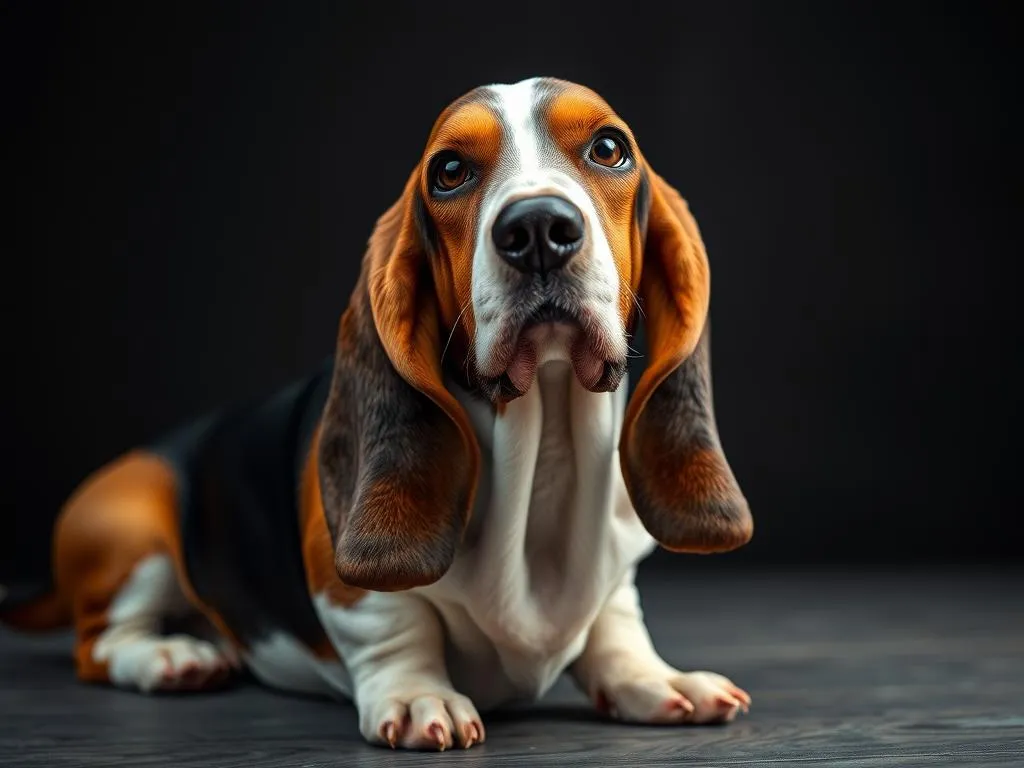
Introduction
The Basset Hound is a breed with a distinctive appearance and a charming personality. Known for their droopy ears, large eyes, and short stature, these dogs have a unique charm that endears them to many. However, before bringing a Basset Hound into your home, it’s crucial to understand the pros and cons associated with this breed. This knowledge will help ensure that you make an informed decision that aligns with your lifestyle and preferences.
History of the Basset Hound
The Basset Hound’s history can be traced back to France, where they were developed as scent hounds. Their name derives from the French word “bas,” meaning low, which reflects their short legs. Originally bred for hunting small game such as rabbits and hares, Basset Hounds were valued for their incredible sense of smell and tenacity in tracking scents.
Historically, these dogs played a vital role in hunting, often working alongside hunters to help locate prey. Their low stature allowed them to navigate dense underbrush effectively. Over time, their role shifted from primarily hunting to being cherished companions, leading to their growing popularity as family pets. The Basset Hound was officially recognized by various kennel clubs, including the American Kennel Club (AKC), solidifying its status as a beloved breed.
Physical Characteristics
Basset Hounds are easily recognizable due to their unique physical traits:
- Size and Weight: Adult Basset Hounds typically weigh between 40 to 65 pounds and stand about 14 to 15 inches tall at the shoulder.
- Coat Types and Colors: They have a short, smooth coat that comes in various colors, including tri-color (black, white, and tan), lemon (light tan and white), and red and white.
- Distinct Features: Their long ears are one of their most notable features, contributing to their exceptional sense of smell. Additionally, their droopy eyes give them a soulful expression that many find irresistible.
Temperament and Personality
Basset Hounds are known for their laid-back and affectionate temperament. Here are some personality traits to consider:
- General Temperament Traits: They are gentle, friendly, and loyal, making them excellent companions for families and individuals alike.
- Interaction with Families and Children: Basset Hounds are typically great with children, demonstrating patience and a playful nature that makes them wonderful family pets.
- Compatibility with Other Pets: Generally, Basset Hounds get along well with other pets, including dogs and cats, due to their easygoing nature.
- Energy Levels and Playfulness: While they enjoy playtime, Basset Hounds are not overly energetic. Their low exercise needs make them suitable for various living situations, including apartments.
Pros of Owning a Basset Hound
Affectionate Nature
One of the standout pros of owning a Basset Hound is their affectionate nature. They bond deeply with their families, often following their owners around the house. Their loving demeanor is evident in their behavior, such as leaning against you for attention or cuddling up beside you on the couch.
Low Exercise Requirements
Basset Hounds are ideal for individuals or families with a more relaxed lifestyle. They require less exercise compared to many other breeds, making them suitable for apartment living. A couple of short walks each day and some playtime indoors are usually sufficient to keep them happy and healthy.
Good with Children
Basset Hounds are known for their gentle demeanor, especially around children. Their patience and calm nature make them excellent companions for kids, and they often enjoy participating in family activities. This breed is typically tolerant of the noise and chaos that come with a bustling household.
Unique Appearance
The Basset Hound’s distinctive appearance is another appealing factor. Their droopy eyes and long ears give them a unique charm that many dog lovers find adorable. This breed often attracts attention when out for walks, and their looks can be a conversation starter among dog enthusiasts.
Scent Hound Abilities
As scent hounds, Basset Hounds possess an extraordinary sense of smell, making them natural trackers. This ability allows them to participate in scent-related activities, such as tracking events and nose work classes. Engaging in these activities can provide mental stimulation for your Basset Hound and deepen your bond.
Cons of Owning a Basset Hound
Stubbornness in Training
One of the cons of owning a Basset Hound is their notorious stubbornness. While they are intelligent dogs, they can be quite independent, which may lead to challenges in training. Consistency and patience are key. Using positive reinforcement techniques, such as treats and praise, can help motivate them during training sessions.
Health Concerns
Basset Hounds are prone to certain health issues, including hip dysplasia, ear infections, and obesity. Regular vet check-ups are essential to monitor their health and address any concerns promptly. Potential owners should be prepared for the possibility of health-related expenses as their Basset Hound ages.
Shedding and Grooming Needs
Basset Hounds shed moderately and require regular grooming to manage loose hair. Their short coat is relatively low maintenance, but regular brushing can help minimize shedding and keep their coat clean. Additionally, their long ears need special attention to prevent infections, as dirt and moisture can accumulate.
Potential for Separation Anxiety
Basset Hounds are known for their strong attachment to their families, which can lead to separation anxiety if left alone for long periods. Signs of anxiety may include excessive barking, destructive behavior, or attempts to escape. To alleviate this, gradual training to increase their comfort with being alone, along with providing engaging toys or puzzles, can be beneficial.
Limited Exercise Tolerance
While their low exercise needs can be a positive aspect, it also poses a risk of obesity if their diet is not managed correctly. Basset Hounds thrive on a balanced diet and regular, moderate exercise. Owners should be vigilant about their weight and ensure they maintain a healthy lifestyle to prevent health issues related to obesity.
Ideal Living Conditions
Basset Hounds adapt well to various living situations, but there are certain conditions that suit them best:
- Best Environments: They thrive in homes with plenty of indoor space but can also adapt to apartment living as long as they receive daily walks and playtime.
- Family Dynamics: Basset Hounds do well in family environments where they can receive attention and love. They bond strongly with their families and enjoy being part of daily activities.
- Outdoor Space and Activities: While they enjoy outdoor time, Basset Hounds do not require extensive exercise. Short walks and play sessions in a secure yard are perfect for keeping them stimulated.
Training and Socialization Tips
Training and socialization are crucial for a well-rounded Basset Hound. Here are some tips:
- Importance of Early Training: Early training helps establish good behavior and strengthens the bond between you and your Basset Hound.
- Recommended Training Techniques: Positive reinforcement techniques work best with this breed. Use treats, praise, and playtime as rewards for desired behaviors.
- Socialization: Expose your Basset Hound to different people, pets, and environments to ensure they grow into a well-adjusted adult. Early socialization can prevent potential behavioral issues down the line.
Nutrition and Diet
Maintaining a balanced diet is essential for the health of your Basset Hound. Consider the following dietary needs:
- Recommended Dietary Needs: High-quality dog food that meets the nutritional requirements for their age, size, and activity level is essential.
- Tips for Maintaining a Balanced Diet: Consult with your veterinarian to determine the best diet plan for your Basset Hound, considering any specific health concerns.
- Importance of Portion Control: Monitoring their food intake and avoiding overfeeding is crucial to prevent obesity, which is a common issue in this breed.
Conclusion
In summary, owning a Basset Hound comes with its share of pros and cons. Their affectionate nature, low exercise requirements, and compatibility with children make them an appealing choice for many families. However, potential owners must also consider challenges such as stubbornness in training, health concerns, and the need for regular grooming and socialization.
Before deciding if a Basset Hound is the right breed for you, take some time to evaluate your lifestyle, living situation, and preferences. Understanding these factors will help ensure that both you and your future furry friend can enjoy a harmonious and fulfilling relationship.
FAQs
Common Questions About Basset Hound Care
-
Are Basset Hounds good family pets?
Yes, Basset Hounds are known for their gentle and affectionate nature, making them excellent family pets. -
How much exercise do Basset Hounds need?
They require moderate exercise, usually consisting of short walks and playtime. -
Do Basset Hounds shed a lot?
Basset Hounds shed moderately, so regular grooming is recommended to manage their coat. -
What health issues are common in Basset Hounds?
They are prone to hip dysplasia, ear infections, and obesity, so regular vet check-ups are essential. -
How can I prevent separation anxiety in my Basset Hound?
Gradually train them to be comfortable alone, provide engaging toys, and consider crate training to help alleviate anxiety.









